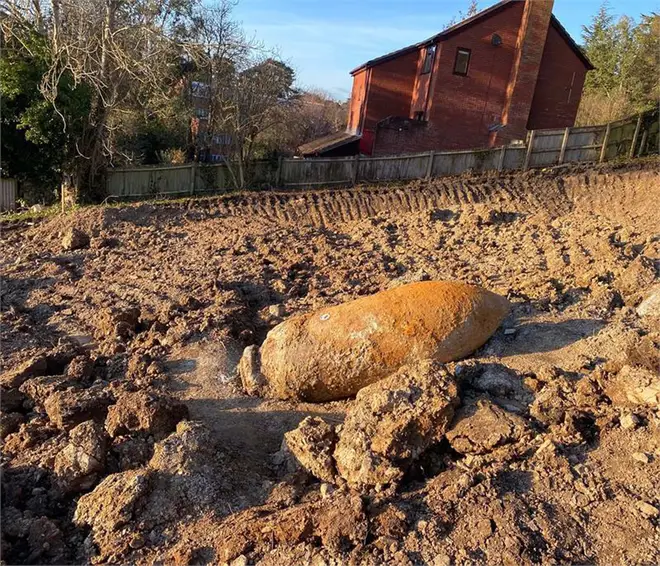
Shelagh Fogarty 1pm - 4pm
1 March 2021, 20:56

Unexploded WWII bomb in Exeter detonated
Hundreds of residents who live near the site in Exeter where a World War Two bomb was detonated are still unable to return to their homes, days after being evacuated.
The device, believed to be a 1,000kg “Hermann bomb” used by the Nazis, was discovered on Friday on a building site west of the University of Exeter campus in Exeter.
A 100-metre cordon was erected and extended to 400 metres on Saturday at the request of the Royal Navy bomb disposal team.
READ MORE: Residents spend third night away from home after unexploded WWII bomb detonated
READ MORE: Buildings left with blown out windows after unexploded World War II bomb detonated
Residents at about 2,600 properties around Glenthorne Road, including 1,400 university students, were evacuated.
The device was destroyed in a controlled explosion on Saturday night, heard from several miles away.
The blast created a huge crater and reportedly shattered the windows and damaged the roofs of nearby houses.
We’ve spent the last 2 days in Exeter supporting the huge multi-agency operation for an unexploded WW2 bomb. This is from the drone the moment it was detonated...
— Alliance Police Drones (@PoliceDrones) February 28, 2021
(the 2nd clip is thermal imaging)#exeter @BBCNews @SkyNews @DevonLiveNews @DC_Police @BBCSpotlight @itvwestcountry pic.twitter.com/LECX9foVTy
The original cordon has now reduced but several hundred residents remain away from their homes, including 500 students.
Exeter City Council said no decision had yet been made on when the cordon would be lifted.
"The council thanks residents for their patience and will publish updates as soon as they become available," a spokesman said.
However the reduced cordon remains, with protective fencing in place until it is safe for residents to return to their homes. Our map shows the area within the reduced cordon: https://t.co/vgxAlrSdlO
— Exeter City Council (@ExeterCouncil) March 1, 2021
"The council is asking those residents who live within the reduced cordon who haven't been put up in hotels to contact the council.
"The University of Exeter has confirmed that 1,400 students were evacuated from their accommodation and 900 have returned today.
"Around 500 remain displaced until it is safe for them to return."
Dr Todd Gray, a historian at the University of Exeter, said the bomb was most likely to have been dropped by the Luftwaffe in April or May 1942 during a series of attacks known as the "Baedeker" raids, which were carried out on several historic cities.

"In total there were 19 air raids on the city but those in the spring of 1942 caused extraordinary damage and a high loss of life," he said.
"The blitz of Exeter was the single most destructive event in the city's history since at least the attack by the Vikings in 1003.
"In total nearly 300 Exonians lost their lives and 1,734 buildings were destroyed. Another 18,849 properties were damaged.
"Thousands of incendiary bombs and 80 to 100 high-explosive bombs were dropped on Exeter in the final raid. Around 40 high explosive bombs did not detonate.
"Although the Baedeker bombings were intended to crush morale, the Luftwaffe did not merely attack Exeter just for its beauty - strategic sites were targeted including the railway, which lies near the site of the unexploded bomb."